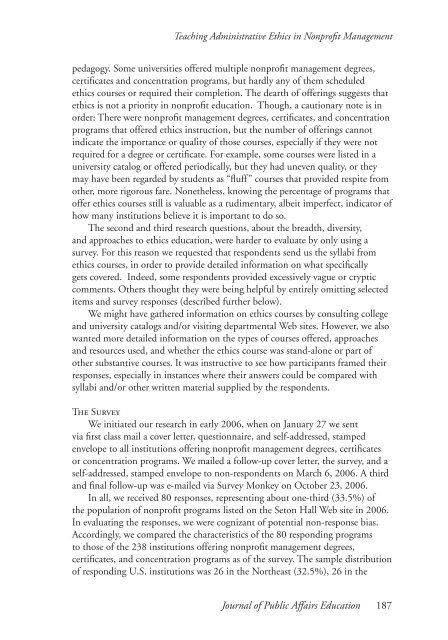JOURNAL OF PUBLIC AFFAIRS EDUCATION - Naspaa
JOURNAL OF PUBLIC AFFAIRS EDUCATION - Naspaa
JOURNAL OF PUBLIC AFFAIRS EDUCATION - Naspaa
You also want an ePaper? Increase the reach of your titles
YUMPU automatically turns print PDFs into web optimized ePapers that Google loves.
Teaching Administrative Ethics in Nonprofit Managementpedagogy. Some universities offered multiple nonprofit management degrees,certificates and concentration programs, but hardly any of them scheduledethics courses or required their completion. The dearth of offerings suggests thatethics is not a priority in nonprofit education. Though, a cautionary note is inorder: There were nonprofit management degrees, certificates, and concentrationprograms that offered ethics instruction, but the number of offerings cannotindicate the importance or quality of those courses, especially if they were notrequired for a degree or certificate. For example, some courses were listed in auniversity catalog or offered periodically, but they had uneven quality, or theymay have been regarded by students as “fluff” courses that provided respite fromother, more rigorous fare. Nonetheless, knowing the percentage of programs thatoffer ethics courses still is valuable as a rudimentary, albeit imperfect, indicator ofhow many institutions believe it is important to do so.The second and third research questions, about the breadth, diversity,and approaches to ethics education, were harder to evaluate by only using asurvey. For this reason we requested that respondents send us the syllabi fromethics courses, in order to provide detailed information on what specificallygets covered. Indeed, some respondents provided excessively vague or crypticcomments. Others thought they were being helpful by entirely omitting selecteditems and survey responses (described further below).We might have gathered information on ethics courses by consulting collegeand university catalogs and/or visiting departmental Web sites. However, we alsowanted more detailed information on the types of courses offered, approachesand resources used, and whether the ethics course was stand-alone or part ofother substantive courses. It was instructive to see how participants framed theirresponses, especially in instances where their answers could be compared withsyllabi and/or other written material supplied by the respondents.The SurveyWe initiated our research in early 2006, when on January 27 we sentvia first class mail a cover letter, questionnaire, and self-addressed, stampedenvelope to all institutions offering nonprofit management degrees, certificatesor concentration programs. We mailed a follow-up cover letter, the survey, and aself-addressed, stamped envelope to non-respondents on March 6, 2006. A thirdand final follow-up was e-mailed via Survey Monkey on October 23, 2006.In all, we received 80 responses, representing about one-third (33.5%) ofthe population of nonprofit programs listed on the Seton Hall Web site in 2006.In evaluating the responses, we were cognizant of potential non-response bias.Accordingly, we compared the characteristics of the 80 responding programsto those of the 238 institutions offering nonprofit management degrees,certificates, and concentration programs as of the survey. The sample distributionof responding U.S. institutions was 26 in the Northeast (32.5%), 26 in theJournal of Public Affairs Education 187
















